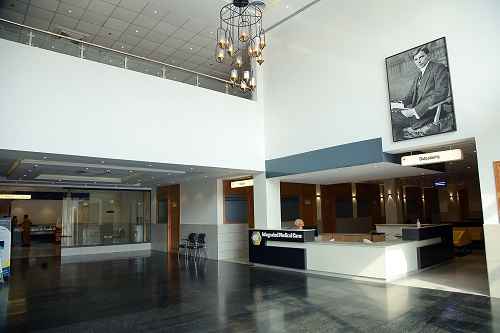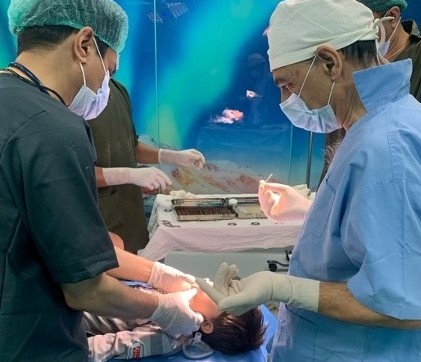- 19-Dec-22
An ophthalmologist performs eye surgery and prescribes eyeglasses and contact lenses to cure vision issues, ophthalmologists also diagnose and treat all eye illnesses. Eye surgery can treat most of the issues and diseases related to the eye and Ophthalmologists are the doctors one refers to when one has an eye condition.
What is an Ophthalmologist?
Ophthalmologists are professionals that manage all elements of medical eye care including diagnosis, treatment, surgery, prescription of glasses and contact lenses as well as eye medications. Ophthalmologists are experts in the treatment of eyes. Ophthalmologists; in contrast to optometrists and opticians are medical doctors (MD) or osteopathic doctors (DO) who have specialised training and expertise in the diagnosis and treatment of eye and vision diseases. Ophthalmologists are qualified to treat patients' eyes surgically and medically.
Ophthalmology Meaning in Urdu
عینیات - سائنس کی وہ شاخ جو آنکھوں کی ساخت، افعال اور بیماریوں سے متعلق ہے۔
Many different disorders can be treated with eye surgery including cataracts, glaucoma, detached retinas, retinal tears, diabetic retinopathy and nearsightedness or farsightedness.
What are some types of Eye Surgery?
The following describes the typical types of eye surgery.
Blepharoplasty:
A small incision or incisions are made by the doctor to remove skin, muscle, and/or fat in order to correct droopy eyes.
Cataract Surgery:
A cataract is a cloudy area in the lens of your eye that can reduce your vision. The doctor uses microscopic tools to remove the clouded lens and replace it with an artificial lens.
Corneal Transplant:
The doctor replaces the damaged portion of your cornea with healthy donor tissue while using a special tool to keep your eye open.
Glaucoma Surgeries:
For glaucoma implants, the physician inserts a thin tube known as a shunt into the white of your eye. The tube aids in the drainage of surplus fluid from the eye which lowers eye pressure. A tiny hole is made under your eyelid at the top of your eye during a trabeculectomy to allow the surplus fluid to drain.
LASIK (laser in-situ keratomileusis):
When an adult with nearsightedness, farsightedness or astigmatism undergoes this laser eye surgery, the doctor modifies the cornea's shape with a powerful laser beam which improves their vision.
Retina surgeries:
A damaged or detached retina can be fixed using a variety of techniques, some of which can be combined. The doctor may use a freezing probe (cryopexy) or a laser to induce tiny burns that will repair a tear or hole and help keep your retina in place (photocoagulation). In scleral buckle surgery, the surgeon wraps a small, flexible band around the sclera which is the white area of your eye. This band gently prods your eye's sides in the direction of your retina to aid in their reattachment. In pneumatic retinopexy, the physician places a tiny air bubble in the center of your eyeball to force your retina back into position before performing the freezing or burning procedure. In order to provide the surgeon better access to the retina and create space for the bubble, During a vitrectomy, the majority of the vitreous is removed using a suction tool (the gel-like fluid that fills the eye).
Special anesthesia note for pneumatic retinopexy patients:
It is crucial that you inform your anesthesiologist in advance of any operation if you will be having one soon after having pneumatic retinopexy. After your eye surgery, an air bubble may still be present in your eye for five days to several months. Some anesthetics can interact with this air bubble and alter its size.
Eye muscle surgery:
When a person has strabismus, one or both of their eyes may drift inward, outward, upward or downward. Surgery is not the only option for treatment but if it is necessary, a surgeon will use procedures to weaken or strengthen the eye muscles in an effort to return them to their normal position. This can entail cutting a muscle in half or reattaching a muscle to another area of the eye.
Best Eye Hospitals in Lahore
Integrated Medical Care Hospital (IMC Hospital) is one of the most prestigious institutions in Pakistan which is known for its performance and outstanding results regarding Ophthalmology (Eye Surgery). Ophthalmology Department at Integrated Medical Care Hospital provides clinical eye care under the leadership of one of the most, senior and competent Opthamologist in the country.
Here you find one of the best Ophthalmology (Eye Surgery) Specialist in Lahore Pakistan. Visit today and book your appointment at Integrated Medical Care Hospital (IMC Hospital).
Dr. Tayyab Eye Specialist Lahore
IMC Ophthalmology Department is led by Prof. Dr. Muhammad Tayyab, who is among the most esteemed Ophthalmologist in the country. His decades of experience in Ophthalmological practice coupled with his extensive training in the UK makes him a capable and clinically remarkable leader for our team. His team is fully equipped with cutting-edge surgical equipment to provide treatment and care to all kinds of ocular problems. IMC provides the full spectrum of Ophthalmology services, from diagnosis to treatment.
Dr. Muhammad Tayyab
MBBS (KE), LRCP & LRCS (Royal College Edinburgh & Glasgow), DO (London), FRCS (Glasgow), FRCS (Edinburgh), FRCOphth (London), FICOph (London), Fellowship in VitreoRetinal Surgery (UK).
Specialties:
Ophthalmology (Eye Surgery).
Areas Of Focus:
Vitreoretinal Surgery, Phaco Surgery, Corneal Transplants, Squint Correction, Glaucoma Management
Introduction: "Prof. Dr. Tayyib is a medical graduate with post-graduation and specialization in ophthalmology from Royal Colleges of Surgeons & Physicians Edinburg, Glasgow and London and the International College of Ophthalmologists London, UK. Dr. Tayyib is one of the renowned eye surgeons of Pakistan, having more than 40 years of professional experience at both national and international levels. He has served in prominent positions including Head & Professor of Ophthalmology at Services Institute of Medical Sciences, Post Graduate Medical Institute & Services Hospital, Lahore, Pakistan. He has also served within the senior faculty of ophthalmology at Allama Iqbal Medical College & Jinnah Hospital, King Edward Medical College & Mayo Hospital, and Post-graduate Medical Institute & General Hospital. Furthermore, he has also served at Birmingham & Midland Eye Hospital UK as Trainer in Vitreoretinal Surgery and at Stonehouse Hospital, Scotland as Registrar in Ophthalmology. He also served at Royal Infirmary Leicester, the UK as Senior House Officer Ophthalmology. Dr. Tayyib has also authored various publications on ophthalmology in national and international peer-reviewed journals."

 Map
Map










